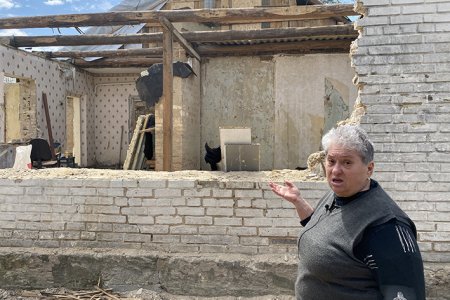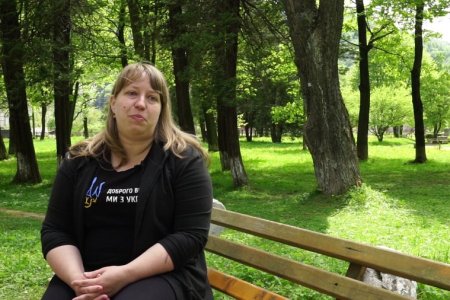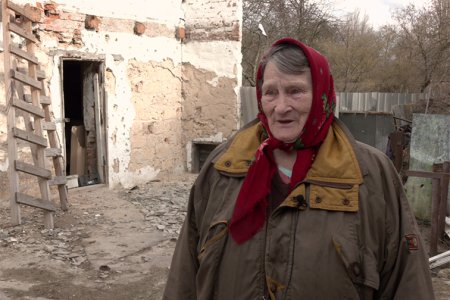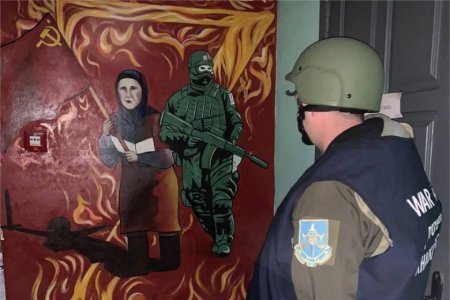Can you remember what 24 February 2022 was like for you?
Yes, I remember. My bedroom windows overlook Brovary [Kyiv Region], so I remember how the explosions started there. I could hear well. I didn’t know then that the war had begun. I found out later when I turned on the TV. And the next day, my youngest and eldest granddaughters came to me from Brovary. Fleeing from the war, they thought that it would be safer here. There was a lull in the following days, but they began to shoot on the eighth of March.
We were sitting at the table with my grandson when suddenly, a military plane flew over our house, and shelling began. The windows of the neighbors’ house were shattered.
A few days later, my eldest grandson also came to me. So, he once went into the garden and found a rocket sticking out of the ground. Then I often thought — why were we attacked? Why are we being fired upon? It seems they were a fraternal nation, but now they have become such enemies.
What happened in the following days?
The children left, their father took them out, and I stayed with my oldest grandson.
Why didn’t you evacuate? Did you have such an opportunity?
I didn’t evacuate because I barely can walk. By the way, my grandson did not leave me, and he stayed with me. And on 14 March, at 10 am, shooting started: there was a powerful explosion, and I heard the house’s windows falling out. I called my grandson, then looked — he was hiding in the corridor. Then there were several more explosions, and the windows shuddered again. After that, we went into the street and saw that the opposite house had been destroyed. There was smoke in the garden, the barn caught fire, and almost all the homes on our street burned down.
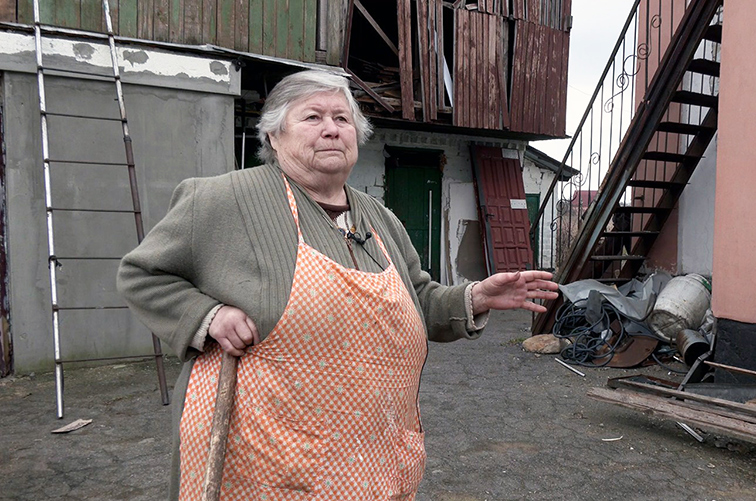
Have you ever thought a full-scale Russian Federation invasion is possible?
I have never thought that! By the way, I often went to Russia, to Moscow, to sell strawberries. True, I can say that they have never been hospitable, but I would never have thought that this would happen.
Did you have an emergency go bag?
No, there was none because I was sure there would be no war. I argued with those who claimed the opposite — what kind of war can there be in the 21st century? I am already 73; I grew up after the Second World War and knew hunger and cold, but I was sure this would not happen again. And I witness such terrible destruction again...
How did the occupation of Velyka Dymerka begin, and what was happening then?
There were shellings every day: as a rule, in the morning and the evening. It started at 9 in the morning, and the tanks drove back and forth along our street as if along Khreshchatyk [central street in Kyiv]. They went and shot at residential buildings. Once during the shooting, I was in the yard. They shot at our house; I fell to the ground and miraculously did not die. I don’t know how the bullet missed me.
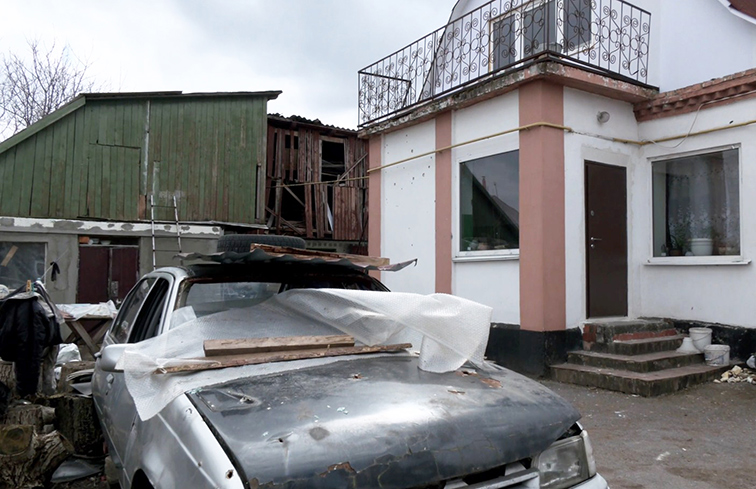
What do you know about Russian war crimes in Velyka Dymerka?
On the 16 or 17 of March, my neighbor Sasha approached me: he was slightly drunk; we talked, and I told him not to wander around the village because it was dangerous. He didn’t listen and kept walking. And at the crossroads, he met the Russian military, and began either arguing with them or resisting, so they shot him on the spot. And a little further in the house lived tenants: the man went out into the street in beautiful sneakers, and the Russians ordered him to take off his shoes. He refused, so they shot him too. He bled all night, and I don’t know what happened to him afterward.
Did you communicate with the Russian military?
Everyone was hiding, and no one talked to them. However, some people interacted with them. There was one guy, but they shot him. Who will talk after this? I? No! Once, I went into the street and saw Russians riding in tanks with red armbands. So I ran. And you try to run around the gardens with my stick.
Did the Russian military enter your house?
Maybe they did, but my grandson and I almost always hid in the cellar, so we were invisible.
However, the Russians fired at the cellars closer to the street under the fences.
And our cellar is not visible, as it is behind the house. We also threw branches and weeds on top. The shops were all destroyed. They took vodka and a snack: they say they had no food at all.
Were there any cases of looting during the occupation of Velyka Dymerka?
They say yes. In neighboring Bohdanovka, a lot of things were also taken from people. And I don’t know for sure what they took from me. But I saw how they constantly drove around the village on scooters with machine guns: every evening, they drove and shot.
How did you eat?
We still had our food supplies, and when the Russians came, volunteers helped us.
How did you get through all this emotionally?
I survived, and I still “survive”. My teeth fell out from stress and anxiety, and I almost lost hearing. In a word, I experienced this grief very hard! And how hard it is for those at the front, in the trenches ... Cold, snow, rain, and they must protect us. God bless them all!
How does your grandson feel?
He, too, suffered and lost some teeth. Imagine, when there were explosions, our house literally jumped a few meters. The grandson became very nervous ...
What property was damaged?
Everything was damaged: house, barn, furniture, two refrigerators, heating, water heater. I still can’t heat the water and wash myself normally. Almost nothing survived. Doors, walls — everything was destroyed.
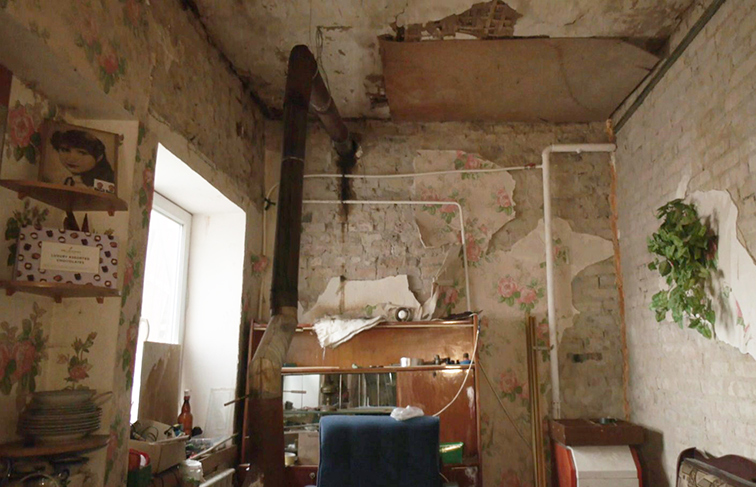
Do volunteers help you?
Yes. They helped me a lot. Alena, who did not give her last name, helped a lot. Gables and doors were installed, and the roof was fixed.
Does the state help?
They said they would help when the war was over. But how do I know who and how will help? The only thing is that the village council gave compensation of 25,000 UAH. That’s all. I bought a water heater, but can’t install it. I have seven heating batteries broken, each costing 5-6,000 UAH. Where do I get money to buy them?
Has your attitude towards Russians changed?
Very much. If it were my will, I would wipe them off the face of the earth. It seems to me that they are non-humans who torment other people. We didn’t harm them. And Belarus upsets me. How is it possible?!
What are you planning to do next?
What should I plan? Living in a house is almost impossible: the walls are crumbling, the ceiling is hanging. I don’t know what will happen ... As God wills. I already lived so long! But we definitely will not return to the cellars.
